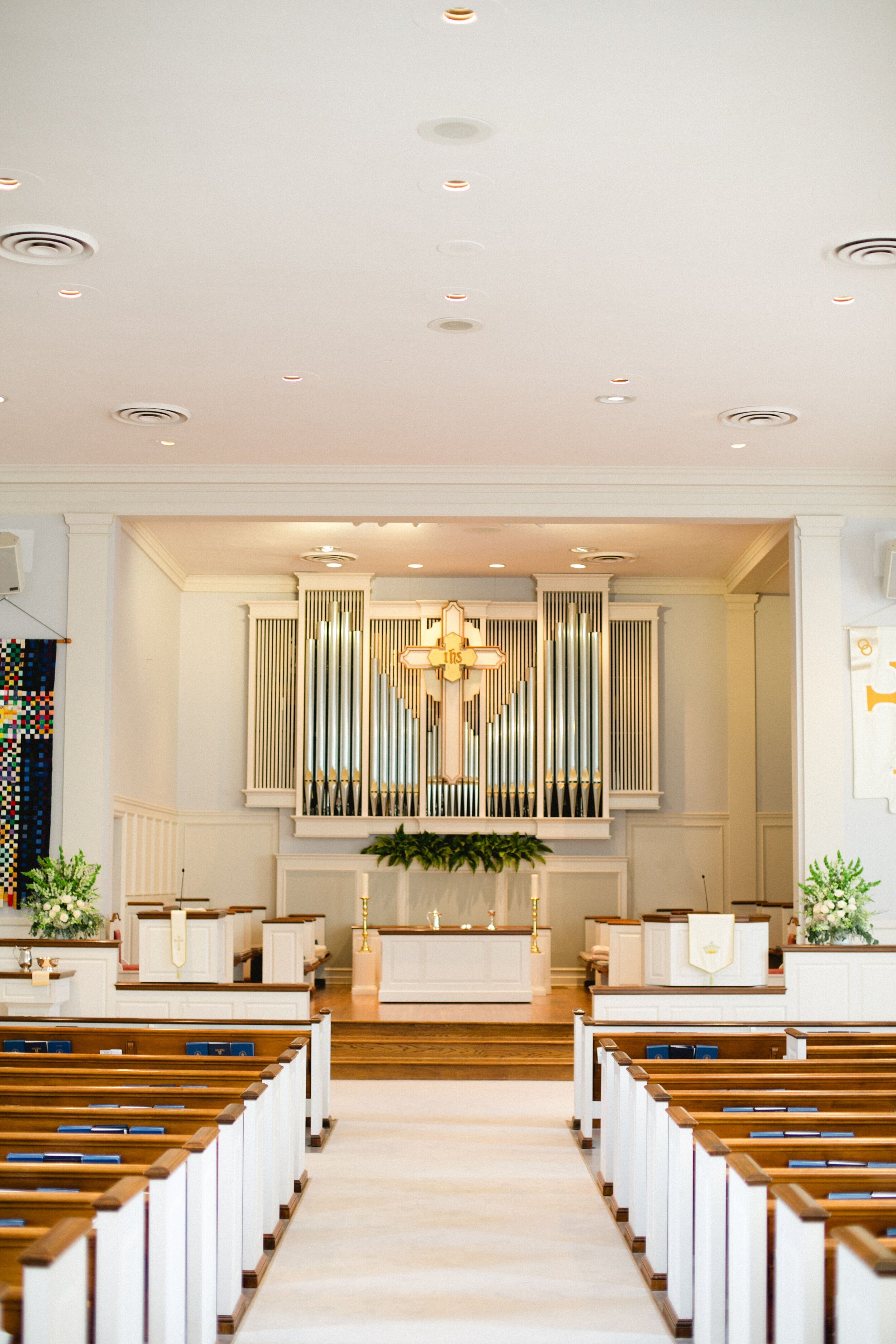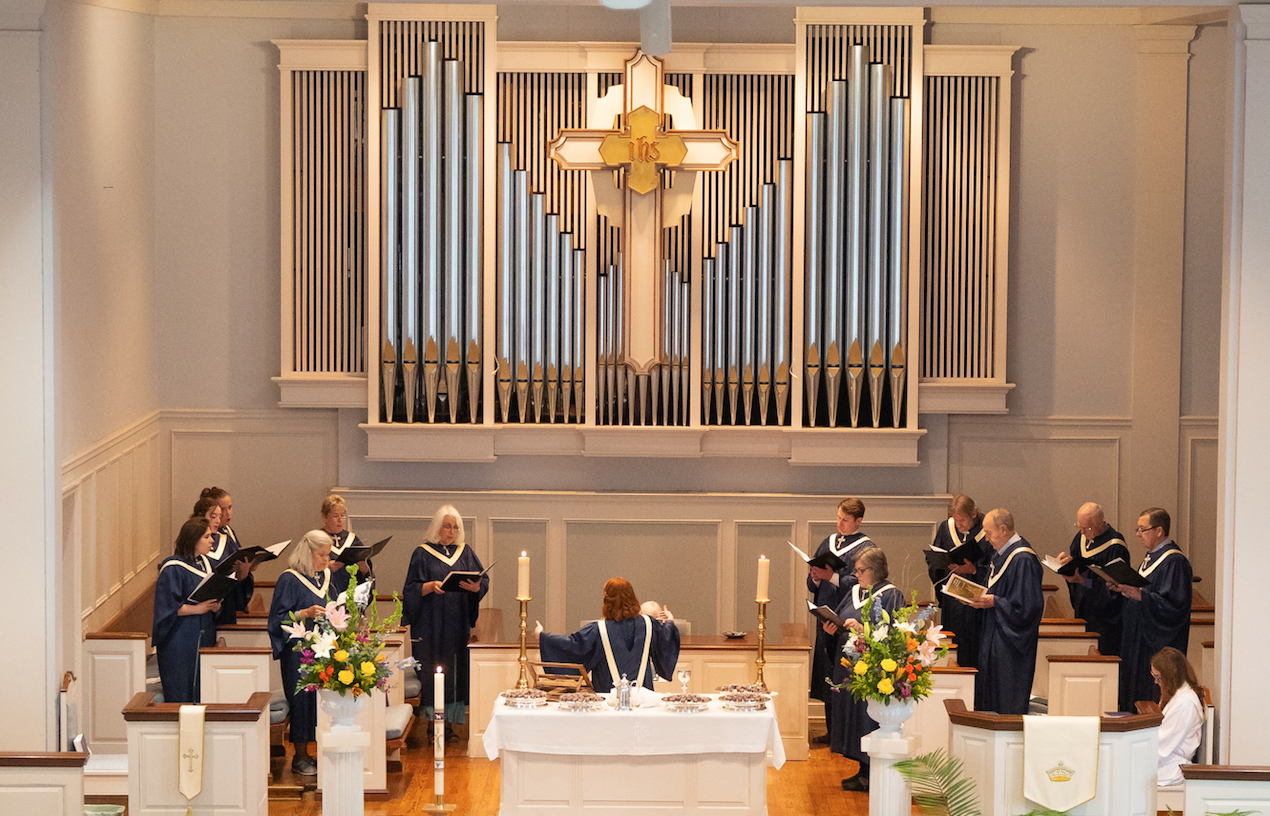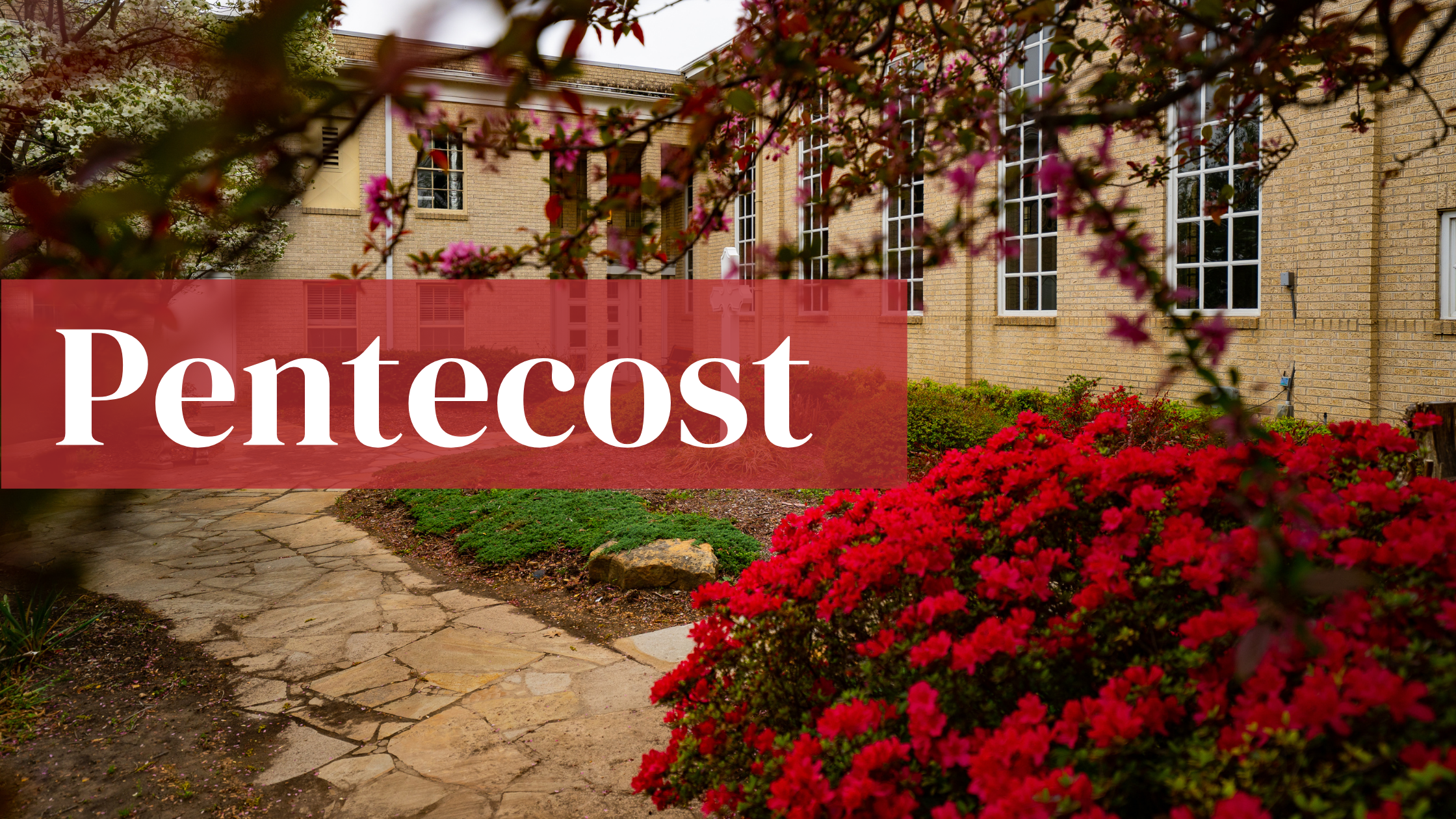
Southminster is a worshipping community of faith. We strive to be The Heart of Brookside for worship. Through scripture and preaching, praying and singing, we worship God together in Christ’s church.
Worship is welcoming at Southminster. Everybody is included. Nobody is left outside. You will be warmly welcomed here. Comes as you are, and you will encounter people worshiping in shorts and t-shirts and suits and ties.
The Vision for our congregation is to be:
A Loving Community of Faith
Inclusive and Welcoming of All
Family-Centered and Multigenerational
Passionate About Worship
Missionally Active
Focused on Spiritual Formation
What To Expect In Worship
Our worship is traditional meaning that it follows a set liturgy, but we also have great flexibility and creativity within that framework. Worship begins as the church gathers together. The Word is read and proclaimed. We respond to the Word. Finally, we are sent to take the that Word out into the world.
Our choir provides excellent music including anthems and solos. An organ or piano accompanies the hymns. Often we take advantage of the talented musicians in our congregation to provide extra layers of sound to the hymns and songs.
In months with fifth Sundays, the Jazz band leads the service music.

Music
The Chancel Choir practices each Wednesday at 6:30pm.
The Chancel Choir continues to work hard for the enhancement and enrichment of worship. The adult choir is led by Greg Landburg. Anyone interested is invited to participate. The Chancel Choir continues to sing almost every Sunday morning, and enjoys learning new anthems. The choir’s work is highlighted each year with special music during the Easter and Christmas/Advent seasons.
Child Care
Trained childcare is offered at all worship services and church events. Two childcare workers are always present to promote a safe and happy environment. Childcare is available in the nursery in the education wing of the first floor.
Find out more about children in worship.
Hearing Aids
The sanctuary at Southminster Presbyterian Church is equipped with a hearing aid system to assist worshippers in participating in the service. Please ask an usher for hearing aid as you enter for worship.
Communion
Communion at Southminster is celebrated on the third Sunday of the month and special days like Palm Sunday, Easter, Pentecost, and Christ the King Sunday. We receive communion by the process of intinction where worshipers come forward to receive the elements, the bread is broken off and given to them, the bread is then dipped into the cup, and worshipers eat while returning to their pew.
A few times a year, communion is celebrated as trays of bread and juice are passed through the seated congregation.
Special Worship Services
Southminster is a vital community of faith. We gather to worship together every Sunday, but some worship services or times of the year are particularly meaningful or different. Below is information about some of the most important days in the Christian calendar.
Advent
“Advent” means “coming” or “arrival.” During the season of Advent, we celebrate Christ’s coming into the world and watch with expectant hope for his coming again. In its historical origins, the season of Advent was patterned after the season of Lent, a six-week period of penitence and preparation for Easter. Similarly, the four weeks of Advent present an opportunity for communal discernment and personal examination, as the church prepares to celebrate the Nativity of the Lord and looks with hope for Christ’s return.
Lent
The season of Lent is a time of prayer, fasting and self-examination in preparation for the celebration of the resurrection of the Lord at Easter. It is a period of 40 days — like the flood of Genesis, Moses’ sojourn at Mount Sinai, Elijah’s journey to Mount Horeb, Jonah’s call to Ninevah to repent and Jesus’ time of testing in the wilderness. (The Sundays in Lent are not counted in this reckoning of the time between Ash Wednesday and Easter, as every Lord’s Day is a celebration of the resurrection of Jesus Christ.)
In the early church, Lent was a time of preparation for the celebration of baptism at the Easter Vigil. In many communities of faith it remains a time to equip and nurture candidates for baptism and confirmation and to reflect deeply on the theme of baptismal discipleship.
Good Friday
Good Friday is the day we remember Jesus’ crucifixion. The hours of noon to 3 p.m. are particularly significant as these commemorate the time Jesus hung on the cross. It is an especially important time to pray for the church and the world for whom Christ gave his life.
Christmas
What is “Christmas”? It is three words: God in flesh; or four syllables: in-car-na-tion. The Gospel according to John (1:14) tells us, “The Word became flesh and lived among us, … full of grace and truth.” Christmas proclaims that God has come in flesh, has come “to save us all from Satan’s power.” Christmas celebrates far more than a birthday; Christmas acclaims the advent of messianic salvation. Christ was sent among us in order to save us. …
What we pay homage to at Christmas, therefore, is that the ultimate fulfillment of God’s saving purpose begins with the birth of Jesus, the messianic Savior. God’s only Son is born among us in order to save the world. This is the message of Christmas.
Palm Sunday
Passion / Palm Sunday begins Holy Week, a time in the church year when we remember how Christ gave his life in love for the world. As this service opens, the crowd waves palm branches, wanting to crown Jesus as king. But as the story of the passion unfolds, their shouts of praise turn to demands for his crucifixion; he receives a crown of thorns as he is handed over to be mocked and killed.
Easter Sunday
The festival of the Resurrection of the Lord (or Easter Sunday) is the center of the Christian year. On this occasion the church joyfully proclaims the good news that is at the very heart of the gospel: that Jesus Christ is risen from the dead.
It is sometimes said that every Sunday is a little Easter; liturgical theologian Laurence Stookey suggests that it might be more appropriate to say that every Easter is a great Sunday (Calendar: Christ’s Time for the Church, Abingdon Press, 1996, 158-161). Easter Sunday is the Lord’s Day writ large: a great annual celebration of Christ’s resurrection on the first day of the week. As such, the service should be centered around the typical and fundamental elements of Christian worship on the Lord’s Day: the proclamation of the Word and the celebration of the Lord’s Supper. Easter Sunday is also an especially appropriate time for the sacrament of Baptism, if not celebrated during the Easter Vigil of the previous night.
Ash Wednesday
Ash Wednesday begins the season of Lent with a public act of confession and contrition. Acknowledging that all have sinned and fallen short of the glory of God, we stand in solidarity as fellow creatures before our Creator, acutely aware of our mortality. In the face of our transience, we pledge ourselves anew to live unto God’s Word in Jesus Christ, the eternal Word that remains forever.
Maundy Thursday
Maundy Thursday begins the Three Days (or Triduum), remembering the new commandment that Christ gave us in word and deed as he taught us how to love one another, washing our feet as a servant. We also celebrate the Lord’s Supper, remembering the meal Christ shared with his disciples before his death.
Pentecost
On the Day of Pentecost we celebrate the gift of the Holy Spirit descending in a mighty rush of wind and flame to inspire the church’s proclamation of Christ’s rising and to empower its mission and ministry to the world. (See Acts 2:1-13; see also Joel 2:28-32.)
The notion of Easter as a season of 50 days ending at Pentecost is patterned after the ancient Jewish festival of seven weeks that extended from the beginning of the barley harvest (on the second day after the beginning of Passover) to the end of the wheat harvest at the Festival of Weeks or Shavuot (see Deuteronomy 16:9-12). The Festival of Weeks later came to be called Pentecost (“50th day”) by Greek speaking Jews. In Jewish tradition, Shavuot also marks the giving of the law to Moses at Sinai; this liturgical link may inform Paul’s discussions of the law and the Spirit.
See Romans 8, 2 Corinthians 3 and Galatians 3.
Life Events
Our lives of faith are marked by special times where we gather as a community of faith. These are often times of celebration. They mark transitions in life. Sometimes they are even met with tears. As The Heart of Brookside, we love to mark these special occasions with you. Below you will find information about three of those times: baptism, marriage, and death.
Baptism
At Southminster and in the Presbyterian Church (USA), we baptize people of every age and background, as an acknowledgement not of our choice of God, but of God’s choice of us. From the creation of the universe, we have always been the beloved and chosen children of God. In baptism, we mark that loving and gracious choice.
We believe, “Baptism is the sign and seal of incorporation into Christ. Jesus through his own baptism identified himself with sinners in order to fulfill all righteousness. Jesus in his own baptism was attested Son by the Father and was anointed with the Holy Spirit to undertake the way of the servant manifested in his sufferings, death, and resurrection. Jesus the risen Lord assured his followers of his continuing presence and power and commissioned them “Go therefore and make disciples of all nations, baptizing them in the name of the Father and of the Son and of the Holy Spirit, and teaching them to obey everything that I have commanded you. And remember, I am with you always to the end of the age” (Matt. 28:19, NRSV). The disciples were empowered by the outpouring of the Spirit to undertake a life of service and to be an inclusive worshiping community, sharing life in which love, justice, and mercy abounded.”
If you would like to be baptized or would like to have your child baptized, please contact Rev. Olivia Lane at 918-743-4427 to talk about the details and requirements for baptism.
Marriage
Southminster’s beautiful sanctuary has been the location of many weddings through the years. It is the ideal wedding venue with it’s long center aisle. The church is also home to a brides parlor, commercial kitchen, dining hall, and gym to meet all wedding and reception needs.
In the Presbyterian Church (USA), we understand that “Marriage is a gift God has given to all humankind for the well-being of the entire human family. Marriage involves a unique commitment between two people, traditionally a man and a woman, to love and support each other for the rest of their lives. The sacrificial love that unites the couple sustains them as faithful and responsible members of the church and the wider community.
In civil law, marriage is a contract that recognizes the rights and obligations of the married couple in society. In the Reformed tradition, marriage is also a covenant in which God has an active part, and which the community of faith publicly witnesses and acknowledges.” (Book of Order W-4.9000)
For more information about weddings at Southminster, costs, and policies, please contact the church office at 918-743-4427.
Death
Southminster is here to serve and mourn with you at the time of your death or the death of a loved one. Memorial Services held in the sanctuary of Southminster Presbyterian Church mourn the loss, celebrate the life, and serve as witnesses to the resurrection of Jesus Christ.
Services can also be held in Tyler Chapel or in our Memorial Garden. Cremains may be interred in Tyler Chapel’s columbariums or ashes spread in our Memorial Garden.
Rev. Olivia Lane is also available for graveside services.
To pre-plan your Memorial Service or to make arrangements for a loved one, please contact the Southminster church office at 918-743-4427.
















